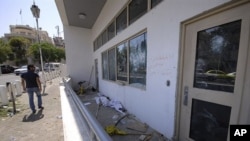Pro-government crowds attacked the U.S. and French embassies in Damascus Monday, in the latest escalation of Syrian government anger over foreign moral support for the country’s pro-democracy protesters. At the same time, the government crackdown continued in the central city of Homs.
According to reports from Damascus, the crowd at the U.S. embassy breached the perimeter wall and damaged at least one building in the compound before being dispersed by U.S. Marine guards.
U.S. officials in Washington accused Syrian security forces, who are supposed to protect the embassy, of reacting slowly and allowing the pro-government crowd through. No injuries were reported among protesters or embassy staff.
Protesters also attacked the U.S. ambassador’s residence a short distance away - as well as the French embassy.
The two countries’ ambassadors made surprise visits to the restive town of Hama last week, prompting formal protests from Syria and two days of street demonstrations against the United States and France. Syria says the ambassadors are inciting anti-government unrest. But that unrest began weeks ago, and activists say the government’s crackdown has killed 1,600 people. Syria's government says hundreds of security force members have also been killed.
The United States and France, along with other Western nations, have expressed support for Syria’s pro-democracy protesters and condemned the government’s crackdown, which continued Monday in the central city of Homs.
But the Western nations have not moved to intervene to protect the opposition protesters, nor called for the removal of Syria’s government, as they have in Libya.
The former British ambassador to Libya, Richard Dalton, now at London’s Chatham House, says the difference is based on what he calls “an unfortunate fact of international life.”
“And that relates to the fact that the international community acts through the interests of nation-states, and the interest of a nation-state is only to intervene in the way it did in Libya if the situation is of limited extent and likely to be of limited duration," said Dalton.
Dalton says there is no power, or group of powers, prepared to intervene on the scale that would be necessary in Syria, which has a much stronger military and a much more strategic place in the Middle East than Libya does.
While the protests and crackdown continued Monday, the government held the second day of its “national dialogue.” Some opposition figures are attending, and have criticized the government in sessions attended by Vice-President Farouk Al-Sharaa.
The vice-president says the government is ready to end 48 years of one-party rule. But experts are skeptical, and the main opposition leaders are boycotting the meetings, saying there can be no real dialogue until the crackdown ends and imprisoned activists are released.
Crowds Attack US, French Embassies in Damascus
- By Al Pessin




